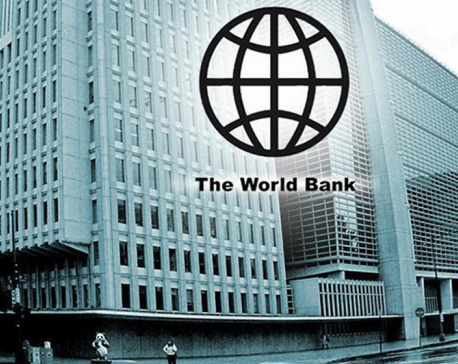
OR
WB projects Nepal’s economic growth rate at 3.9 percent in FY 2021/22
Published On: January 13, 2022 07:15 AM NPT By: Republica | @RepublicaNepal

KATHMANDU, Jan 13: The World Bank (WB) has projected Nepal’s economic growth to stay at 3.9 percent in 2021/2022, almost half of the rate that the government has been insisting on achieving.
The WB in its report titled ‘Global Economic Prospects’ has projected that the economic growth will decelerate in the current fiscal year, citing the possible disruption in economic activities due to rapid spread of the Omicron variant of the pandemic. The multilateral lending agency, however, has projected that Nepal will achieve a growth rate of 4.7 percent in 2022/2023.
Sidelining the ongoing problems like liquidity crunch, soaring consumer price index and rapid spread of the new variant of the pandemic, the government is claiming it will achieve an ambitious target of seven percent for the current fiscal year. On the other hand, the country’s central bank has also stated that it will be difficult to achieve the government’s target.
The WB on the other hand has estimated the low growth rate despite the country making notable efforts in administering vaccines against the pandemic and possible rise in the service oriented businesses. Apart from Nepal, the international organization has also projected low economic growth rate for Pakistan and Sri Lanka among the South Asian countries.
The WB has also projected the global economy to attain a slow growth rate of 4.1 percent in 2022, down from 5.5 percent of 2021. Mostly the governments in many developing countries have utilized their policy tools and are left with minimum policy space to support economic activities, if needed, due to new COVID-19 outbreaks. It will hit persistent supply-chain bottlenecks and inflationary pressures. In addition, elevated financial vulnerabilities could increase the risk of a hard landing in such countries.
“The world economy is simultaneously facing COVID-19, inflation, and policy uncertainty, with government spending and monetary policies in uncharted territory. Rising inequality and security challenges are particularly harmful for developing countries,” reads the WB’s press release quoting World Bank Group President David Malpass.
You May Like This

WB estimates Nepali economy will grow by 5.1 percent in 2022/23
KATHMANDU, Oct 8: The World Bank (WB) has estimated Nepal’s economic growth rate to reach 5.1 percent in the fiscal year... Read More...
_20201014060614.jpg)
Nepal abstains from voting as UNHRC adopts resolution against Sri Lanka's human rights record
KATHMANDU, March 23: Nepal has chosen to abstain from voting in the United Nations Human Rights Council on a resolution... Read More...

Govt should prioritize Miss Nepal: Miss Nepal Shrinkhala Khatiwada
MAKWANPUR, April 24: Newly crowned Miss Nepal World 2018, Shrinkhala Khatiwada has urged the government to prioritize the pageant as... Read More...










Just In
- Heavy rainfall likely in Bagmati and Sudurpaschim provinces
- Bangladesh protest leaders taken from hospital by police
- Challenges Confronting the New Coalition
- NRB introduces cautiously flexible measures to address ongoing slowdown in various economic sectors
- Forced Covid-19 cremations: is it too late for redemption?
- NRB to provide collateral-free loans to foreign employment seekers
- NEB to publish Grade 12 results next week
- Body handover begins; Relatives remain dissatisfied with insurance, compensation amount







Leave A Comment